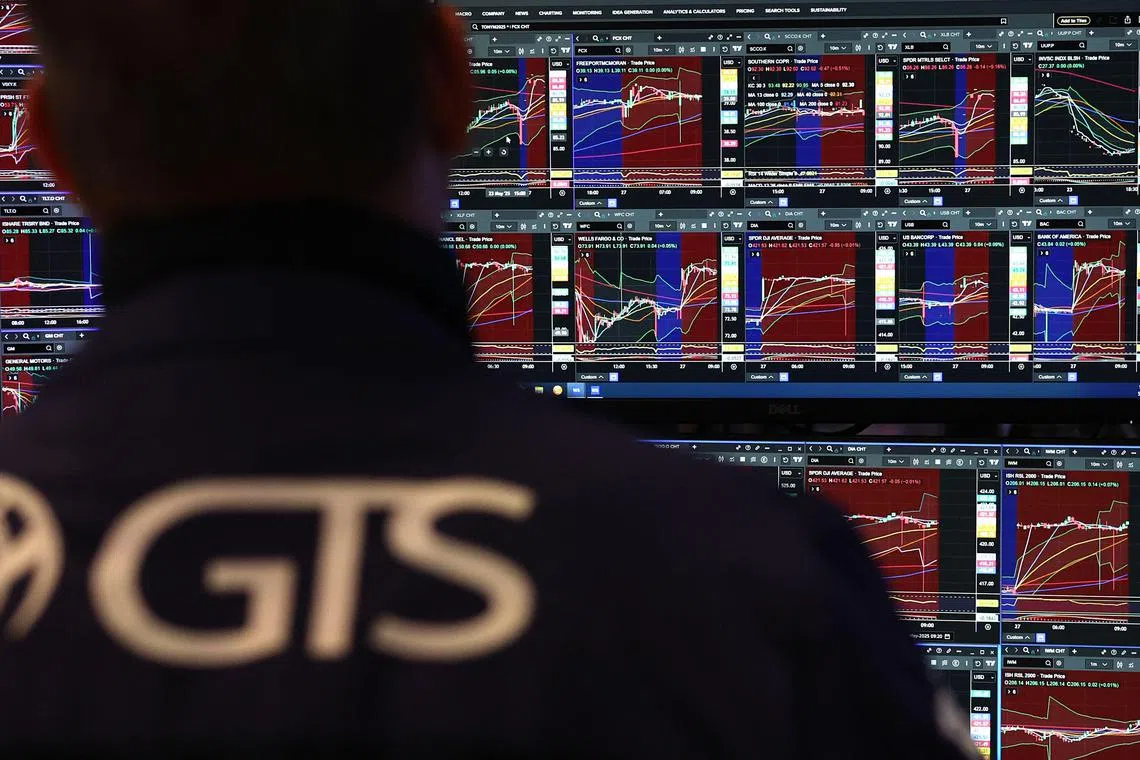This 5-cent meme stock just made up 15% of US trading volume
Sign up now: Get ST's newsletters delivered to your inbox

Meme-stock mania is sweeping US stock markets once again.
PHOTO: AFP
Follow topic:
NEW YORK – Shares of tiny Healthcare Triangle stood out as the most actively traded name on US exchanges on July 24 – just one example of the meme-stock mania sweeping the stock market once again.
The little-known healthcare information technology company saw its stock price more than double to just above five US cents, with over three billion shares changing hands. That was equivalent to about 15 per cent of the total shares traded on US exchanges for the day, data compiled by Bloomberg show.
After surging 138 per cent at the open, Healthcare Triangle’s shares closed up 115 per cent, with no apparent news to spark the eye-popping move.
The total value of shares traded for the day stood at approximately US$150 million (S$192 million), nearly seven times the company’s market capitalisation.
As with previous meme-stock episodes, the targets were struggling firms that influencers hyped as underdogs in a market controlled by Wall Street pros.
That is what happened during the original meme mania in 2021, when GameStop and AMC Entertainment Holdings soared during a burst of trading spurred by a well-known Reddit user.
Meme-driven spikes can deliver multi-billion-dollar windfalls – and steep losses for anyone who jumps in too late. Here’s what you should know.
Why do these frenzies keep happening?
Meme stocks tend to share several characteristics – including that they catch the internet’s imagination and get promoted on social media by influential retail investors. The posts are often accompanied by images or videos – memes – that incorporate pop culture references.
Buying the stocks can be seen as a badge of honour or a way to join a club, with investors cheering on one another to snap up shares. Most meme moments have involved high-profile consumer brands like GameStop and AMC in 2021. In the current frenzy, it is Opendoor, Krispy Kreme, GoPro and Beyond Meat.
They also tend to be stocks that have a large short interest – meaning that professional investors are betting against them – and are often cheap on a per-share basis.
How does this round of meme mania compare with the Covid-era saga?
The backdrop in 2025 is fundamentally different from what existed in 2021, when US investors who were stuck at home during the pandemic and flush with stimulus checks swapped tips on social platforms. Economic conditions like those hanging over the market in 2025, including elevated interest rates and uncertainty over tariff and trade policy, normally would deter investors from making risky bets, but speculative corners of the market are once again lighting up.
The latest meme frenzy involves fewer stocks than in 2021, but the rallies have been volatile and often short-lived. Take Opendoor: Its shares jumped 43 per cent on July 21, when 1.9 billion shares traded, amounting to nearly 10 per cent of all US stock-trading volume that day. Behind the sharp rally lay an explosion in options flow: More than 3.4 million contracts changed hands on July 21, a level eclipsing even the highest one-day total during GameStop’s 2021 surge.
Meanwhile, companies such as Kohl’s and Krispy Kreme ripped higher amid short squeezes, market terminology for what can happen when traders bet on a price falling by borrowing shares and immediately selling them, only to have the price suddenly rise instead. The traders are forced to quickly buy back the securities, further fuelling the rally.
The surge was not sustained for Krispy Kreme – while shares of the doughnut maker rose as much as 39 per cent when the market opened on July 23, it closed only 4.6 per cent higher.
Are meme stocks risky?
Trading meme stocks can be very risky because the reasoning behind buying them has almost nothing to do with the performance or prospects of the underlying business. Meme stocks also can be volatile, elevating the risks of buying and selling the shares, especially for inexperienced market participants.
For instance, GameStop stock has lost more than 70 per cent of its value from its peak in January 2021, while AMC has plunged nearly 99 per cent since its June 2021 high.
The main driver for meme stocks to rally is the rush of the crowd looking to strike out against the Wall Street establishment, but as AMC and GameStop showed, sooner or later a company’s fundamentals tend to prevail, bringing the party to an end.
Why do these flare-ups happen?
A sudden, unexplained run-up in the share price of a consumer company often can be traced to posts on Discord, Reddit, trader chatroom StockTwits and other sites. In 2021, the GameStop frenzy began when bullish posts by investor Keith Gill, known by his online persona Roaring Kitty, sent the retailer’s shares soaring.
In the July 2025 meme-stock episode, Opendoor was the subject of chatter among retail traders on social media after Dr Eric Jackson, founder of Toronto-based hedge fund EMJ Capital, made a series of posts on X encouraging buying. It was then listed as one of the most actively traded names on StockTwits, and was being heavily cited by posters on Reddit’s WallStreetBets thread.
Is all of this legal?
The US Securities and Exchange Commission polices illegal market manipulation, but it has to prove intent. Talking up a stock can be illegal if it is done by someone seeking to push the price higher and then profit from the momentum.
The ethics of social media influencers driving share swings have been hotly debated. Sceptics argue that meme-stock promoters often do not disclose important details such as the size of their positions in companies, when they trade them and whether they are paid to endorse stocks. Others argue that promoting investments on social media is similar to activist investors pushing for changes or short sellers releasing reports targeting companies in order to profit. BLOOMBERG

